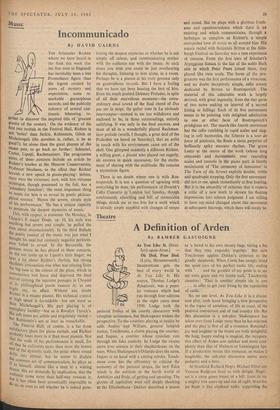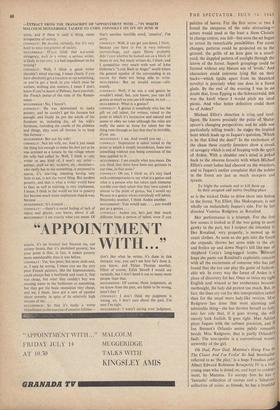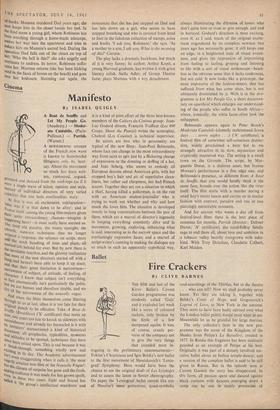Theatre
A Definition of Arden
By 13AMBgR GASCOIGNE As You Like It. (Strat- ford-upon-Avon.) — Oh Dad, Poor Dad.
(Lyric, Hammersmith.) SHAKESPEARE gets the best of every world in As You Like. It. His source, Thomas Lodge's Rosaly,nde, was a popu- lar romance which had run through four editions in the eight years since 1590. Lodge took the pastoral frolics of his courtly characters with complete seriousness, but Shakespeare widens the perspective. To the courtiers playing at rustics he adds Audrey and William, genuine lumpish rustics, Touchstone, a clown playing the courtier, and Jaques, a courtier whose cynicism cuts through the fake rusticity. In Lodge the swains carve love sonnets to their shepherdesses on the trees. When Shakespeare's Orlando does the same, Jaques is on hand with a cutting rebuke. Touch- stone even has the effrontery to criticise the economy of the pastoral utopia, the new Eden which is the antidote to the harsh world of Ambition and Pride, of getting and spending. The glories of capitalism were still deeply shocking to the Elizabethans—Dekker described a usurer as 'a bawd to his own money, bags, taking a fee that they may engender together.' Btit now Touchstone applies Dekker's criterion to the goodly shepherds. When Corin has smugly listed the quiet joys of his perfect rustic life, ending with . . and the greatest of my pride is to see my ewes graze and my lambs suck,' Touchstone counters : 'That is another simple sin in you . . to offer to get your living by the copulation of cattle.'
So, on one level, As You Like It is a discus- sion play, each scene bringing a hew perspective to the topics of ambition, of life at court, of the pastoral convention and of real country life. But this discussion is a sub-plot. Shakespeare has taken over from Lodge more than he has rejected. and the play is first of all a romance. Rosalind's joy and laughter in the forest are truly delightful, the long, happy ending is magical, the recupera- tive effect of Arden acts quicker and more com- pletely than that of Malvern or Leamington Spa If a production misses this romance, or makes it laughable, the sub-plot discussion seems mere pedantry and a bore.
At Stratford Richard,Negri, Michael Elliot ane Vanessa Redgrave feast us with delight. Negri': set is a steep green breast of a hill; from its tor a mighty tree soars up and out of sight; branches jut from it like elephant tusks, supporting flat palettes of leaves. For the first scene or two I found the steepness of the rake distracting— actors would need at the least a Stem Christie to change course, one felt—but soon the set began to reveal its remarkable possibilities. For scene changes, patterns could be projected on to the ground; the grille of an iron gate in a court. yard, the dappled pattern of sunlight through the leaves of the forest. Superb groupings could be formed without any blatant use of 'levels.' And characters could converse lying flat on their backs—which (quite apart from its theatrical novelty) is precisely what one does in a forest glade. By the end of the evening I was in no doubt that, from Epping to the Schwarzwald, this was the knoll where I would pitch my ideal picnic. And what better definition could there be of Arden?
Michael Elliot's direction is crisp and in tel. ligent. He knows precisely the pulse of Shake. speare's changing perspectives, and he adds one particularly telling touch : he stages the implied hunt which leads up to Jaques's question, 'Which is he that killed the deer?' In the excitement ol the chase these courtly foresters show a streak of savagery which is out of keeping with the spirit of Arden. With a shudder one's mind is jerked back to the obscene ferocity with which Michael Elliot's court ladies had cheered on the wrestlers and to Jaques's earlier complaint that the noblet in the forest are just as much usurpers and tyrants
To fright the animals and to kill them up In their assigned and native dwelling-place
as is the wicked Duke to drive them into hidini in the forest. Yet Elliot, like Shakespeare, is nol wholly on melancholy Jaques's side. For he hat directed Vanessa Redgrave as Rosalind.
Her performance is a triumph. For the lirsi few scenes it looked as if she was going to seen gawky in the part, but I sus'pect she intended it. Her Rosalind, very properly, is mewed up in court clothes. As soon as she gets into the forest she expands, throws her arms wide to the air and frolics up and down Negri's hill like one ol shepherd Corin's long-legged lambs. tetween leaps she pants out Rosalind's euphuistic conceib with all the excitement of someone who has just found that she too can play the game of fashion. able wit. In every way the forest of Arden is a place of discovery for her. Once or twice my tight English soul winced at her exuberance because methought, the lady did protest too much. But, ill fact, the lines cry out for this interpretation rathel than for the usual more lady-like version. MiSs Redgrave has done that most alarming and admirable thing—she has thrown herself so full) into her role that, if it goes wrong, she will merely look foolish. It goes right. Max Adrian plays Jaques with the calmest precision, and il Ian Bannen's Orlando seems palely romantic beside Miss Redgrave, that is partly Orlando's fault. The tree-spoiler is a conventional wooer, unworthy of the girl.
Oh Dad, Poor Dad, Mamma's Hung You In The Closet And I'm Feelin' So Sad, hereinafte referred to as 'the play,' is a huge Freudian joke. Albert Edward Robinson Rosepettle IV is a had young man who is doted on, and kept in confine. ment, by Mamma. To occupy him he has 'fantastic' collection of stamps and a labuloot, collection of coins; as friends, he has a trunk WI of books. Mamma murdered Dad years ago; she now keeps him in the closet beside her bed. In the final scene a young girl, whom Robinson has been watching through a home-made telescope, makes her way into the apartment and tries to seduce him on Mamba's sacred bed. During the Operation Dad falls out of the closet on top of her; 'Who the hell is this?' she asks angrily and continues to undress. In terror, Robinson suffo- cates her. Mamma returns (she has been kicking Sand in the faces of lovers on the beach) and goes into her bedroom. Storming out again, she announces that she has just stepped on Dad and has lain down on a girl, who seems to have stopped breathing and who is covered from head to foot in the fabulous collection of stamps, coins and books. 'I ask you, Robinson,' she says. `As a mother to a son, I ask you. What is the waning of this?' Curtain.
The play lacks a dramatic backbone, but much of it is very funny; its author, Arthur Kopit, a young Harvard graduate, has written it with great literary relish. Stella Adler, of Group Theatre fame, plays Mamma with a wry detachment.




































 Previous page
Previous page